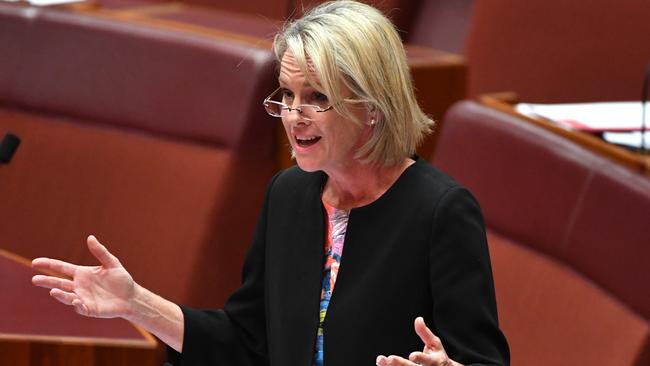Q&A Wrap: Fiona Nash admits royal commission needed to come earlier
Former Nationals MP Fiona Nash admits she was wrong and the Royal Commission into banks should have occurred earlier.

Former National Party Senator Fiona Nash has admitted that the government “got it wrong” by not holding a Banking Royal Commission earlier.
Speaking on the ABC’s Q & A program, Ms Nash responded to questions that she had originally opposed a royal commission into the banking sector by saying the government made a mistake.
“We got it wrong, we absolutely got it wrong,” Nash said.
“We should have done it sooner and not being in government anymore, I’m happy to put my hand up and say I was wrong then.”
Ms Nash was one of the most high profile casualties of last year’s citizenship crisis and was forced to resign from a 12-year career in politics after her British dual citizenship was revealed.
She now works as a strategic adviser for Charles Sturt University.
What can we do to ensure that our government isn’t ‘of the banks, by the banks, for the banks'? @SenatorNash & @ALeighMP respond #QandA pic.twitter.com/7e11XxgpQh
— ABC Q&A (@QandA) April 23, 2018
“Clearly, (the royal commission) is very significant. People in this country want things to be fair and they particularly don’t like seeing the big guys mistreating the little guys,” she said.
“It’s very important we’re seeing what we’re seeing and I think we’ll see a big change.”
Opposition assistant Treasury spokesman Andrew Leigh commended Ms Nash for her admission but took a swipe at the government’s reluctance to take responsibility for delaying the inquiry.
“Real credit to Fiona for showing how gracefully one can apologise and say they got it wrong,” Mr Leigh said.
“If only we’d seen that from the PM and his ministers when they’ve been asked the same question in the last couple of days.”
He described evidence heard in the opening days of the royal commission as “awful”, admonishing the government for its tardy response to calls for a royal commission several years before.
“Wouldn’t it be great if we were now looking at fixing some of these problems, rather than just getting started?
“We could have been into this two years ago. Instead we still had a government that was trying to backslide on some of our reforms to make sure, for example, financial advisors acted in the best interests of their clients.”
Author Rebecca Huntley suggested politicians, witnessing the royal commission’s revelations, were out of touch with the attitudes in the electorates.
“We’ve had these people in politics say all the things that are coming out of the commission are a surprise,” she said.
“They’re not really a surprise to the electorate.”
HOUSING AFFORDABILITY
Australian National University political lecturer Jill Sheppard said the housing affordability crisis in Australia was impacting young people’s ability to achieve traditional notions of security and wealth.
“If we don’t want to pay rent or high mortgages or don’t want to live in the conditions that keep us out of the property market, we will be commuting a long way,” Ms Sheppard said.
“Superannuation is an excellent safety net but it’s going to change over the next generation how we think about rich and poor.
“How we think about who has security and stability and safety in Australia, because it might not be driven by assets anymore.”
Do you think it’s difficult for the new emerging affluent group to establish themselves? @jillesheppard @RebeccaHuntley2 & John Roskam respond #QandA pic.twitter.com/aS0rMdpvcq
— ABC Q&A (@QandA) April 23, 2018
Ms Huntley said the inequality between older generations and younger and emerging generations’ ability to enter the property market was being felt across the nation.
“There is nothing more depressing than sitting with two hard-working school teachers who say that ‘we will never be able to afford a home and have children, and afford child care,’” Ms Huntley said.
“They tell me ‘we have given up on it, we hope our parents keep drinking heavily and eating bad foods so maybe they’ll die a little bit earlier than we might have expected and we may be able to inherit their home’.”
Executive director of Australian think tank the Institute of Public Affairs, John Roskam said the future of housing affordability looked extremely grim for anyone who was not a baby boomer.
“I think the political class is, by and large, made up of baby boomers who have had a wonderful few generations that many of us are now going to be paying for,” Mr Roskam said.
Mr Leigh agreed that housing affordability was a “national crisis”.
.@ALeighMP says home ownership is a national crisis and we must close tax loopholes. @SenatorNash says there is much on offer in regions #QandA pic.twitter.com/SqPxNzzHsv
— ABC Q&A (@QandA) April 23, 2018
“The home ownership rate in Australia is now the lowest it’s been in six decades,” he said.
“The combination of the capital gains tax discount and negative gearing, unique to Australia, means that we were providing more taxpayer funded assistance to someone buying their seventh house than to someone their first house. We’ve got to rein that in.”
Ms Nash suggested more people purchase homes in the regions, where living costs are low.
“We’ve seen an exodus of tree changes and sea changes,” she said.
“Of people moving out of the cities, to the regions, that have housing affordability, a great sense of community, and are tremendous places to bring up a family.”
Royal commission: forget fuzzy feelings, give me boring bankers any day




